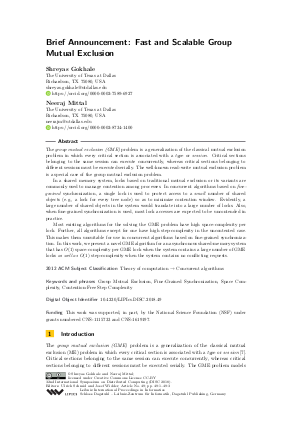Brief Announcement: Fast and Scalable Group Mutual Exclusion
Authors
Shreyas Gokhale  ,
Neeraj Mittal
,
Neeraj Mittal 
-
Part of:
Volume:
32nd International Symposium on Distributed Computing (DISC 2018)
Part of: Series: Leibniz International Proceedings in Informatics (LIPIcs)
Part of: Conference: International Symposium on Distributed Computing (DISC) - License:
 Creative Commons Attribution 3.0 Unported license
Creative Commons Attribution 3.0 Unported license
- Publication Date: 2018-10-04
File

PDF
LIPIcs.DISC.2018.49.pdf
- Filesize: 229 kB
- 3 pages
Document Identifiers
Subject Classification
ACM Subject Classification
- Theory of computation → Concurrent algorithms
Keywords
- Group Mutual Exclusion
- Fine-Grained Synchronization
- Space Complexity
- Contention-Free Step Complexity
Metrics
- Access Statistics
-
Total Accesses (updated on a weekly basis)
0PDF Downloads0Metadata Views
Abstract
The group mutual exclusion (GME) problem is a generalization of the classical mutual exclusion problem in which every critical section is associated with a type or session. Critical sections belonging to the same session can execute concurrently, whereas critical sections belonging to different sessions must be executed serially. The well-known read-write mutual exclusion problem is a special case of the group mutual exclusion problem. In a shared memory system, locks based on traditional mutual exclusion or its variants are commonly used to manage contention among processes. In concurrent algorithms based on fine-grained synchronization, a single lock is used to protect access to a small number of shared objects (e.g., a lock for every tree node) so as to minimize contention window. Evidently, a large number of shared objects in the system would translate into a large number of locks. Also, when fine-grained synchronization is used, most lock accesses are expected to be uncontended in practice. Most existing algorithms for the solving the GME problem have high space-complexity per lock. Further, all algorithms except for one have high step-complexity in the uncontented case. This makes them unsuitable for use in concurrent algorithms based on fine-grained synchronization. In this work, we present a novel GME algorithm for an asynchronous shared-memory system that has O(1) space-complexity per GME lock when the system contains a large number of GME locks as well as O(1) step-complexity when the system contains no conflicting requests.
Cite As Get BibTex
Shreyas Gokhale and Neeraj Mittal. Brief Announcement: Fast and Scalable Group Mutual Exclusion. In 32nd International Symposium on Distributed Computing (DISC 2018). Leibniz International Proceedings in Informatics (LIPIcs), Volume 121, pp. 49:1-49:3, Schloss Dagstuhl – Leibniz-Zentrum für Informatik (2018)
https://doi.org/10.4230/LIPIcs.DISC.2018.49
BibTex
@InProceedings{gokhale_et_al:LIPIcs.DISC.2018.49,
author = {Gokhale, Shreyas and Mittal, Neeraj},
title = {{Brief Announcement: Fast and Scalable Group Mutual Exclusion}},
booktitle = {32nd International Symposium on Distributed Computing (DISC 2018)},
pages = {49:1--49:3},
series = {Leibniz International Proceedings in Informatics (LIPIcs)},
ISBN = {978-3-95977-092-7},
ISSN = {1868-8969},
year = {2018},
volume = {121},
editor = {Schmid, Ulrich and Widder, Josef},
publisher = {Schloss Dagstuhl -- Leibniz-Zentrum f{\"u}r Informatik},
address = {Dagstuhl, Germany},
URL = {https://drops.dagstuhl.de/entities/document/10.4230/LIPIcs.DISC.2018.49},
URN = {urn:nbn:de:0030-drops-98381},
doi = {10.4230/LIPIcs.DISC.2018.49},
annote = {Keywords: Group Mutual Exclusion, Fine-Grained Synchronization, Space Complexity, Contention-Free Step Complexity}
}
Author Details
Funding
This work was supported, in part, by the National Science Foundation (NSF) under grants numbered CNS-1115733 and CNS-1619197.
References
-
V. Bhatt and C. C. Huang. Group Mutual Exclusion in O(log n) RMR. In Proceedings of the 29th ACM Symposium on Principles of Distributed Computing (PODC), pages 45-54, JUL 2010.

-
R. Danek and V. Hadzilacos. Local-Spin Group Mutual Exclusion Algorithms. In Proceedings of the 18th Symposium on Distributed Computing (DISC), pages 71-85, OCT 2004.

-
S. Gokhale and N. Mittal. Fast and Scalable Group Mutual Exclusion. Available at http://arxiv.org/abs/1805.04819.

-
Y. He, K. Gopalakrishnan, and E. Gafni. Group Mutual Exclusion in Linear Time and Space. In Proceedings of the 17th International Conference on Distributed Computing And Networking (ICDCN), JAN 2016.

-
M. Herlihy and N. Shavit. The Art of Multiprocessor Programming, Revised Reprint. Morgan Kaufmann, 2012.

-
P. Jayanti, S. Petrovic, and K. Tan. Fair Group Mutual Exclusion. In Proceedings of the 22nd ACM Symposium on Principles of Distributed Computing (PODC), pages 275-284, JUL 2003.

-
Y.-J. Joung. Asynchronous Group Mutual Exclusion. Distributed Computing (DC), 13(4):189-206, 2000.

-
K. Platz. Saturation in Lock-Based Concurrent Data Structures. PhD thesis, Department of Computer Science, The University of Texas at Dallas, 2017.

